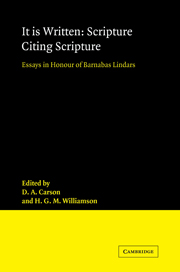Preface
Published online by Cambridge University Press: 16 January 2010
Summary
Amongst those who devote their lives to biblical and cognate study, few achieve the range of mastery displayed by Barnabas Lindars. Most aim to specialise in only one of the two Testaments, or perhaps some smaller corpus; they are at home in Hebrew but not in Greek, or the reverse; they can quote Philo with some authority, but have no sympathy for apocalyptic literature. But from the beginning of his writing and teaching career, what has characterised Barnabas Lindars is the breadth of his competence. While lecturing primarily on the Old Testament at Cambridge, he produced his well-received commentary on John. Many of his students and colleagues look forward to reading his forthcoming commentary on Judges in the prestigious ICC series. Although several of his essays revolve around these two poles, others testify to his interest in the Son of Man, Enoch, biblical criticism, the purpose of law, and various aspects of Christian ethics. Few scholars achieve academic distinction and gain administrative responsibilities in both Studiorum Novi Testamenti Societas and the Society for Old Testament Study, along the way delivering lectures at the International Organization for Septuagint and Cognate Studies.
His membership in the Society of St Francis testifies to his theological, ecclesiastical and pastoral commitments. Initially these commitments kept him from pursuing advanced theological education. Assignment to the chapter in Cambridge allowed him to combine his interests and produce his first major work, New Testament Apologetic: The Doctrinal Significance of the Old Testament Quotations (1961).
- Type
- Chapter
- Information
- It Is Written: Scripture Citing ScriptureEssays in Honour of Barnabas Lindars, SSF, pp. ix - xiiPublisher: Cambridge University PressPrint publication year: 1988



